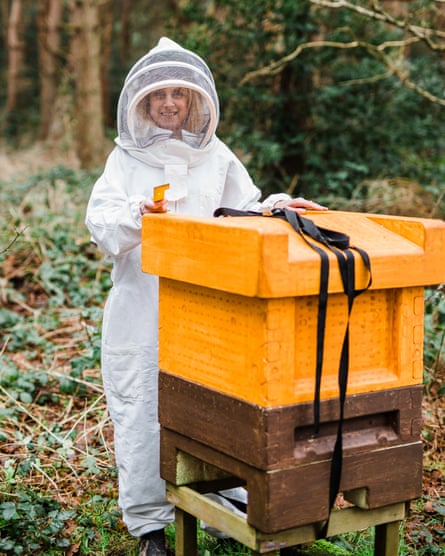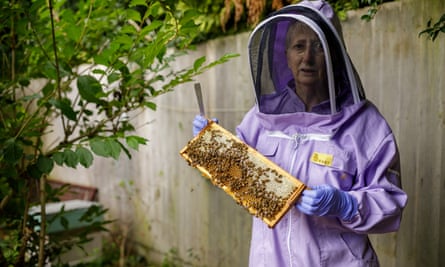When honey made headlines this week as a better treatment for coughs and colds than antibiotics, beekeepers sat smugly by. “I’ve been saying this for ages,” says Carly Hooper, who has 12 hives near her home in Fleet, Hampshire, and a honey-based business.
The study, published in the journal BMJ Evidence Based Medicine, found that honey was a more effective treatment for coughs, blocked noses and sore throats than many remedies more conventionally prescribed.
The researchers from the University of Oxford recommended honey as a cheap, accessible and low-risk treatment for symptoms of upper respiratory tract infection (URTI), on which antibiotics have no effect.
For beekeepers with a steady supply on tap, the findings came as no surprise.
Anne Rowberry, the chair of the British Beekeepers Association, notes that knowledge of honey’s therapeutic benefits dates back to ancient times. “I think sometimes we forget we had some quite good remedies already … There is a thought among beekeepers that honey is good for you.”

Rowberry, who has 20 hives around her home in Bath, applies honey to cuts and grazes and uses it as a low-sucrose sweetener. Bees also produce propolis, a resin-like compound with anti-inflammatory and antimicrobial properties, that Rowberry says makes a “very good mouthwash”.
Hooper was inspired to start her Beeutiful skincare range after she read of honey being used to treat soldiers’ wounds in the first and second world wars. She says a popular balm has been effective in soothing skin conditions and insect bites.
“With plastic-free, use less, recycle more, I feel like more people are going ‘Hang on, maybe I don’t need to go to a pharmacist’,” says Hooper.
Co-author Dr Joseph Lee says the study’s focus was on how to reduce harm from overprescription of antibiotics (though he adds that further research on honey versus placebos is needed, and it is certainly not a “cure-all”).
A desire to reconnect with the natural world is driving an increased interest in beekeeping, says Rowberry, who has been “amazed” by the rise in BBA membership – from 23,400 in January last year to 28,300 today.
The upward trend predates Covid-19 but in lockdown, she says, many have had more time to start a hobby, with online apiary courses booming. On TikTok, beekeeping videos have been viewed 220m times.
Rowberry says many amateur apiarists are motivated by fascination with bees, not their harvest: “There is huge value in sitting quietly and watching the bees go about their business … The honey is just a bonus.”
Paul Hekimian, the director of the nonprofit HoneyLove – who has helped actors Aaron Paul, Sophia Bush, Jennifer Garner and other celebrities to maintain their hives – told the Hollywood Reporter that inquiries have surged since the pandemic. Other famous bee enthusiasts are said to include the actors Morgan Freeman, Leonardo DiCaprio and Samuel L Jackson.
Ed Sheeran reportedly installed hives on his Suffolk estate during lockdown, while David Beckham posted video to Instagram of him building his own from a kit – and his family, wearing bee suits, with the result.

In April the actor Chris Hemsworth shared a clip of his children checking out a Flow hive, an Australian-made structure that produces honey “on tap” – controversial among beekeepers for oversimplifying a complex and time-intensive pastime.
As Hooper warns, of the social media-friendly hobby: “It’s not just get your bees and go on Instagram … You’re only going to help them if you do it properly.” Her interest was sparked by a newspaper article 13 years ago; now, Hooper says, “bees are my life.”
For those prepared to take the time to learn, it is rewarding and absorbing. “When you’re in a heavy cotton bee suit, it’s hot and sweaty, and not particularly glamorous – but I’m totally engrossed in what I’m doing.”
Rowberry is in fact looking to reduce her number of hives so that she has more time to enjoy them. “They’re a fantastic society to watch – there’s so much to learn from them,” she says. For instance, the queen may be the most important bee in the hive, but the workers are in control.
“If she doesn’t come up to scratch, they will oust her,” says Rowberry with a twinkle. “Maybe that’s what we could learn: people running the country should only be there when they’re positively useful.”